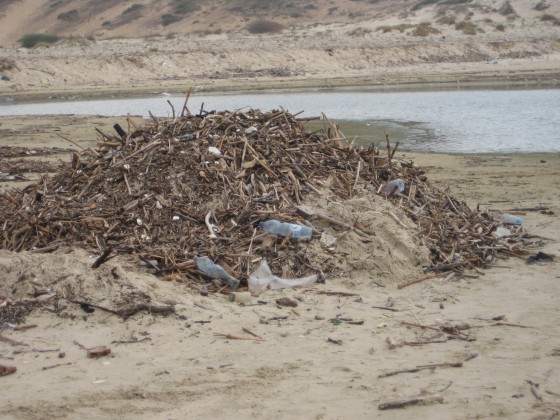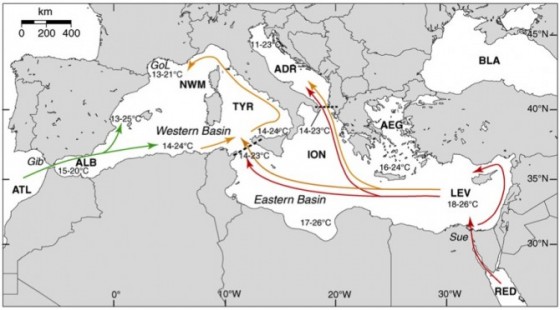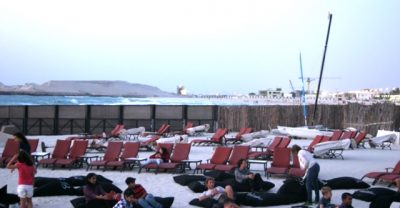 Trash like this at Nahal Poleg kills Mediterranean marine life and pollutes the sea. What does the future hold for of our seas and oceans?
Trash like this at Nahal Poleg kills Mediterranean marine life and pollutes the sea. What does the future hold for of our seas and oceans?
Following the August 1st arrival in Sydney, Australia of environmentalist David de Rothschild and the crew of the Plastiki sailing vessel, more attention has been given to another giant marine “plastic materials garbage patch” in the Atlantic Ocean. This is a “new” phenomenon, which scientists say may be even larger than the “Great Pacific Garbage Patch” that de Rothschild and fellow Plastiki crew members sought to investigate during their 154 days voyage in a boat made almost entirely from recycled plastic and other waste material.
Plastic patches
The “patch” of plastic debris in the Atlantic Ocean is estimated to span the entire breadth of the Atlantic in a swath from Cuba north to the American state of Virginia, according to an article in the scientific website Livescience.com.
Compared to the Pacific garbage patch, the plastic particles in the Atlantic are so small that the extent of the debris cannot be seen by either planes or satellites passing over it, or even by ships passing by or through it. It is believed by the scientists who have been studying it for over 20 years that much of the debris has already sunk to the bottom of the ocean, weighted down by algae and bacteria growth.
The plastic pieces appear to be “remains of plastic from larger consumer items,” according to Kara Lavender Law, an oceanographer with the Sea Education Association at Woods Hole, Massachusetts.
What about the “Med?”
Visible or not, the plastic particles present in such a large section of world’s second largest ocean is a cause for concern. With this in mind, what type of garbage patches are present in smaller bodies of water, particularly a body of water that forms the northern and western borders of a number of Middle Eastern countries, and from which many people still earn their livelihoods from fishing, tourism, and other maritime activities:- the Mediterranean Sea.
Warmed, over-fished and polluted, the Mediterranean Sea is giving scientists a stark look at what may be the future for the rest of our planet’s oceans and seas. The addition of large quantities of discarded plastic material, especially plastic bottles, bags, and even discarded plastic furniture is fast turning the “Med” into one huge plastic garbage patch.
It is certain that the Mediterranean does have its own “floating islands” of plastic and other debris, and studies as far back as the 1970’s mention large amounts of such debris floating in parts of the “Ligurian Sea,” a part of the Mediterranean located off the coast of Southeastern Spain and Northern Italy.
 Current flows into the Mediterranean. Debris can move around a lot this way.
Current flows into the Mediterranean. Debris can move around a lot this way.
Dim forecasts for our seas and oceans
It can well be imagined what is occurring, with more and more plastic bags and containers being used and discarded into the sea by countries that surround this body of water. Even more alarming, except for the narrow opening at the Straits of Gibraltar, and the Suez Canal, the Mediterranean is almost an inland lake (the Black, Aegean, and Adriatic seas are no more than extensions of the Mediterranean).
Another study completed at end of the 1990’s showed quantities of this debris that had been taken from the bellies of dead fish and other Mediterranean marine life.
Now that almost 10 years of the new Millennium has passed, what will be in store for this historic body of water during the next 10 years? An article in a scientific website, wired.com, paints a very depressing picture of the future of the Mediterranean and says that this forecasts the future of the word’s oceans as well.
While not specifically mentioning islands of plastic debris, it does mention general pollution, rising sea temperatures, and an increase of creatures such as jellyfish; creatures that previous Green Prophet articles have noted as arriving in swarms every summer off the coasts of Israel and Lebanon.
And now, with massive oil and natural gas explorations underway in the Mediterranean, with possible military confrontations as a result, maybe large quantities of floating plastic particles are a lesser problem for the “Med,” Or is it?
::Royal Society Publishing.org and wired.com/wiredscience
Read more about Mediterranean environmental issues:
Dealing With Jellyfish Invasions off Israel and Lebanon Coasts
Lebanon’s Environment Inaction May Affect the Entire Region
Tshuva’s Yam Tethys Gas Company Wins in Natural Gas as Marine Environment Expense



Environmentalist David de Rothschild and the Plastiki crew arrived in Sydney on August 1st with only modest fanfare. Does this mean our oceans and seas, including the Mediterranean for sure, are in deep trouble due to people just not caring about what happens to what makes up nearly 70% of this planet?